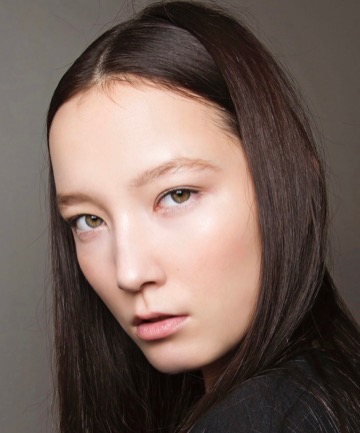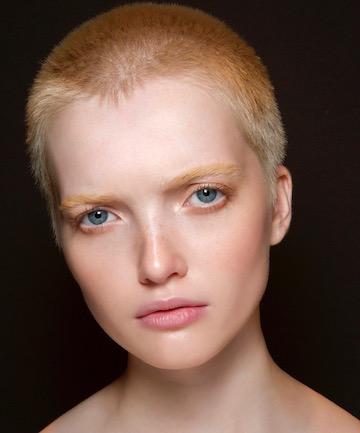We often think of acne as something that affects the delicate skin on our faces. But it can occur anywhere we have oil glands. The higher the concentration of glands, the more prone to acne the area is. That's why our faces are notorious for breakouts, followed by our chests and backs.
While not as common as bacne, scalp acne is an issue that many people face. So, with a little expert input, we decided to break down what exactly scalp acne is, what causes it and the best products to use to prevent, soothe and treat it.
Image via Imaxtree
While not technically a medical term, scalp acne covers a few acne-like conditions that occur on the head. Hence the name.
"The most common and mild (yet annoying) by far is scalp folliculitis," says Dr. Melanie Palm, board certified dermatologist in Solana Beach, California. "This is a breakout focused around hair follicles, typically the back and sides of scalp in adults." She says she sees it about once a week among her patients and considers it pretty common.
A less common form of scalp acne is folliculitis decalvans, which Palm describes as a more severe scalp condition that consists of "lakes of pus," some scarring and even hair loss. Also uncommon is a type of scalp acne that can create bumps (aka acne keloidalis nuchae) and another type caused by fungal infections featuring crusted, acne-like large masses.
Image via Imaxtree
The most common signs of scalp acne include pimples or bumps on your scalp, irritation, redness, crusting and greasy flaking (like dandruff). Less common symptoms, which are the result of more serious forms of scalp acne, include pus, scarring and hair loss.
If you have any of these symptoms and are unable to gain control, it's important to speak with a dermatologist. They can create a customized treatment plan to reduce symptoms and provide relief.
Image via Imaxtree
Palm says the causes are still not entirely understood. Although there are some potential triggers. Those include excessive scalp sweating, the use of some hair products or a history of acne.
"Avoid applying products with excess oil and make sure to wash your scalp regularly," advises Dr. Iris Rubin, board certified dermatologist and founder of SEEN, a line of hair products for acne-prone skin. "Also make sure your hair products are noncomedogenic. It turns out hair care products can leave a residue, or an invisible film on your scalp, which has the potential to clog pores and cause acne or breakouts."
Image via Imaxtree
If you're dealing with a mild to moderate case of scalp acne, you may want to try some over-the-counter options. Using skin-friendly hair formulations can help maintain a healthy scalp. Palm's top choice for a medicated shampoo? DHS SAL Shampoo, $9.60. It contains salicylic acid to gently exfoliate your scalp and improve clarity.
Or opt for an anti-residue or chelating shampoo, especially if you use styling products. Neutrogena Anti-Residue Shampoo, $8.78, gently strips product buildup.
You can also do a pre-shampoo rinse like Sunday Riley Clean Rinse Clarifying Scalp Serum, $48. It's meant to be applied directly to your scalp via a handy narrow nozzle. It also contains rose clay, which acts as a mild astringent. You should also be mindful of which styling products you use. SEEN Blow-Out Creme, $24, provides heat protection, control and shine without clogging your pores.
Image via Imaxtree









